The Palgrave Handbook of Deceptive Communication
Herausgegeben:Docan-Morgan, Tony
The Palgrave Handbook of Deceptive Communication
Herausgegeben:Docan-Morgan, Tony
- Gebundenes Buch
- Merkliste
- Auf die Merkliste
- Bewerten Bewerten
- Teilen
- Produkt teilen
- Produkterinnerung
- Produkterinnerung
Deception and truth-telling weave through the fabric of nearly all human interactions and every communication context. The Palgrave Handbook of Deceptive Communication unravels the topic of lying and deception in human communication, offering an interdisciplinary and comprehensive examination of the field, presenting original research, and offering direction for future investigation and application. Highly prominent and emerging deception scholars from around the world investigate the myriad forms of deceptive behavior, cross-cultural perspectives on deceit, moral dimensions of deceptive…mehr
Andere Kunden interessierten sich auch für
![The Palgrave Handbook of Ethics in Critical Research The Palgrave Handbook of Ethics in Critical Research]() The Palgrave Handbook of Ethics in Critical Research139,99 €
The Palgrave Handbook of Ethics in Critical Research139,99 €![The Contextual Character of Moral Integrity The Contextual Character of Moral Integrity]() Dita SamánkováThe Contextual Character of Moral Integrity39,99 €
Dita SamánkováThe Contextual Character of Moral Integrity39,99 €![The Contextual Character of Moral Integrity The Contextual Character of Moral Integrity]() Dita SamánkováThe Contextual Character of Moral Integrity39,99 €
Dita SamánkováThe Contextual Character of Moral Integrity39,99 €![The Psychology of Tolerance The Psychology of Tolerance]() Rivka T. WitenbergThe Psychology of Tolerance39,99 €
Rivka T. WitenbergThe Psychology of Tolerance39,99 €![Basic Needs, Wellbeing and Morality Basic Needs, Wellbeing and Morality]() Basic Needs, Wellbeing and Morality54,99 €
Basic Needs, Wellbeing and Morality54,99 €![Eine Naturgeschichte der menschlichen Moral Eine Naturgeschichte der menschlichen Moral]() Michael TomaselloEine Naturgeschichte der menschlichen Moral32,00 €
Michael TomaselloEine Naturgeschichte der menschlichen Moral32,00 €![Das verletzbare Selbst Das verletzbare Selbst]() Werner TheobaldDas verletzbare Selbst26,90 €
Werner TheobaldDas verletzbare Selbst26,90 €-
-
-
Deception and truth-telling weave through the fabric of nearly all human interactions and every communication context. The Palgrave Handbook of Deceptive Communication unravels the topic of lying and deception in human communication, offering an interdisciplinary and comprehensive examination of the field, presenting original research, and offering direction for future investigation and application. Highly prominent and emerging deception scholars from around the world investigate the myriad forms of deceptive behavior, cross-cultural perspectives on deceit, moral dimensions of deceptive communication, theoretical approaches to the study of deception, and strategies for detecting and deterring deceit. Truth-telling, lies, and the many grey areas in-between are explored in the contexts of identity formation, interpersonal relationships, groups and organizations, social and mass media, marketing, advertising, law enforcement interrogations, court, politics, and propaganda. Thishandbook is designed for advanced undergraduate and graduate students, academics, researchers, practitioners, and anyone interested in the pervasive nature of truth, deception, and ethics in the modern world.
Produktdetails
- Produktdetails
- Verlag: Palgrave Macmillan / Springer International Publishing / Springer, Berlin
- Artikelnr. des Verlages: 978-3-319-96333-4
- 1st edition 2019
- Seitenzahl: 1080
- Erscheinungstermin: 16. Mai 2019
- Englisch
- Abmessung: 241mm x 160mm x 63mm
- Gewicht: 1785g
- ISBN-13: 9783319963334
- ISBN-10: 3319963333
- Artikelnr.: 52921741
- Herstellerkennzeichnung Die Herstellerinformationen sind derzeit nicht verfügbar.
- Verlag: Palgrave Macmillan / Springer International Publishing / Springer, Berlin
- Artikelnr. des Verlages: 978-3-319-96333-4
- 1st edition 2019
- Seitenzahl: 1080
- Erscheinungstermin: 16. Mai 2019
- Englisch
- Abmessung: 241mm x 160mm x 63mm
- Gewicht: 1785g
- ISBN-13: 9783319963334
- ISBN-10: 3319963333
- Artikelnr.: 52921741
- Herstellerkennzeichnung Die Herstellerinformationen sind derzeit nicht verfügbar.
Tony Docan-Morgan is Professor in the Department of Communication Studies at the University of Wisconsin-La Crosse, USA. His teaching and research span the topics of public communication, interpersonal relationships, and ethics and deception.
1.The Study of Lying and Deception: Historical Perspectives.- 2.Defining Deception, Truth, and Related Concepts.- 3.Moral Dimensions of Deception.- 4.A Review of Meta-Analyses about Deception Detection.- 5.Cultural Perspectives on Lying and Deception.- 6.Implications of Some "Obvious Truths" for Building Theories of Deceptive Message Formulation and Production.- 7.Discursive Dimensions of Deceptive Communication: A Framework for Practical Analysis.- 8.True and False Intentions.- 9.The Reciprocal Nature of Lying and Memory: Memory Confabulation and Diagnostic Cues to Deception.- 10.Manipulating Trust: Exploiting Communication Mechanisms and Authenticity Cues to Deceive.- 11.Affiliative and Exploitive Motives to Deception and Their Differential and Joint Consequences.- 12.Correlates of Self-Assessed Abilities to Tell Lies and Truths: A Review.- 13.Effects of Deception on the Deceiver.- 14.Inauthenticity as a Form of Deceptive Communication.- 15.Understanding Lie Detection Biases with ALIED: A Boundedly Rational Approach.- 16.Unchallenged Deceptions in Social and Professional Relationships.- 17.Managing Face in the Midst of Deception: A Cross-Cultural Examination.- 18.An Overview of Detecting Deceptive Behavior.- 19.Promising New Techniques in Lie Detection.- 20.Individual Differences & Deception Detection Abilities.- 21.Multitasking, Cognitive Load, and Deception.- 22.Nonverbal Cues to Deception.- 23.The Many Faces of Trustworthiness: Accuracy and Inaccuracy in Predicting Deception from Facial Appearance.- 24.Comparing Perceptual and Automated Vision-Based Methods for Lie Detection in Younger Children.- 25.Deception and Language: The Contextual Organization of Language and Deception (COLD) Framework.- 26.Verifiability Approach: Applications in Different Judgmental Settings.- 27."At the End of the Day,When All is Said and Done, Honesty is the Best Policy": An Investigation Into the Potential Role of Formulaic Sequences as a Marker of Deception.- 28.Verbal Cues Fostering Perceptions of Credibility and Truth/Lie Detection,- 29.Detecting Deceptive Intentions: Possibilities for Large-Scale Applications.- 30.Indirect and Implicit Deception Detection: Existing Findings and Emerging Evidence.- 31.The Concealed Information Test: Past, Present, and Future.- 32.Deterring Deception: Theory and New Directions.- 33.Deceptive Affection in Relationships.- 34.Deceiving for and During Sex.- 35.Deception at a Distance: Long-Distance Deception and Romantic Relationships.- 36.Life as Means of Deception within Art and Truth within Psyche: A Comprehensive Analysis of Romantic Deception Portrayals in Art and Psychology.- 37."She is my roommate:" Why and How Lesbian, Gay and Bisexual Individuals Deceive Friends about Their Sexual Orientation.- 38.Linguistic Aspects of Cross-Cultural Deceptive Communication in Polish and English.- 39."Passing" and the Politics of Deception: Transgender Bodies, Cisgender Aesthetics, and the Policing of Inconspicuous Marginal Identities.- 40.Deception in Group Contexts.- 41.Organizational Deception: Lies at Work.- 42.What You Don't Know Can't Hurt You, Can It? Deception in Health Contexts.- 43.Is it Always Better to Tell the Whole Truth? Health Care Professionals and Medical "Bad News".- 44.An Examining of Student Cheating: A Dramaturgical Perspective of Deception and Self-Deception.- 45.The History, Present, and Future of Police Deception during Interrogation.- 46.Deception and the Art and Science of Criminal Interrogation.- 47.Disbelief Repeats as Deception Tagging: Conversational Strategies for Labeling Lies in Interrogations.- 48.Interrogation, Torture, and Deception.- 49.Deception Detection in Courtrooms: Hazards and Challenges for Scholars and Professionals.- 50.Deception Production, Detection, and Beliefs in Online Environments.- 51.Playful Masquerade or Malicious Fraud? Deception in Anonymous Online Communication.- 52."You have Won EUR1,000,000": Analyzing the Discourse Structures of Deceptive Emails.- 53.Visual Deception: From Camo to Cameron.- 54.Ethics of Deception in Mass Communication.- 55.Propaganda, Social Media, and Fake News.- 56.Marketing Deception: An Effects-based Paradigm.- 57.Audiences in the Dark: Deception in Pharmaceutical Advertising through Verbal-Visual Mismatches.- 58.Audience Acceptance of Deceptive News Content.- 59.Propaganda, Politics and Deception.- 60.Disclosing Deception and No One Cares? Fact-Checking and Political Trust During Election Campaigns.- 61.Reality Monitoring in Politics: Language of Lies in the 2016 U.S. Presidential Race.
1.The Study of Lying and Deception: Historical Perspectives.- 2.Defining Deception, Truth, and Related Concepts.- 3.Moral Dimensions of Deception.- 4.A Review of Meta-Analyses about Deception Detection.- 5.Cultural Perspectives on Lying and Deception.- 6.Implications of Some "Obvious Truths" for Building Theories of Deceptive Message Formulation and Production.- 7.Discursive Dimensions of Deceptive Communication: A Framework for Practical Analysis.- 8.True and False Intentions.- 9.The Reciprocal Nature of Lying and Memory: Memory Confabulation and Diagnostic Cues to Deception.- 10.Manipulating Trust: Exploiting Communication Mechanisms and Authenticity Cues to Deceive.- 11.Affiliative and Exploitive Motives to Deception and Their Differential and Joint Consequences.- 12.Correlates of Self-Assessed Abilities to Tell Lies and Truths: A Review.- 13.Effects of Deception on the Deceiver.- 14.Inauthenticity as a Form of Deceptive Communication.- 15.Understanding Lie Detection Biases with ALIED: A Boundedly Rational Approach.- 16.Unchallenged Deceptions in Social and Professional Relationships.- 17.Managing Face in the Midst of Deception: A Cross-Cultural Examination.- 18.An Overview of Detecting Deceptive Behavior.- 19.Promising New Techniques in Lie Detection.- 20.Individual Differences & Deception Detection Abilities.- 21.Multitasking, Cognitive Load, and Deception.- 22.Nonverbal Cues to Deception.- 23.The Many Faces of Trustworthiness: Accuracy and Inaccuracy in Predicting Deception from Facial Appearance.- 24.Comparing Perceptual and Automated Vision-Based Methods for Lie Detection in Younger Children.- 25.Deception and Language: The Contextual Organization of Language and Deception (COLD) Framework.- 26.Verifiability Approach: Applications in Different Judgmental Settings.- 27."At the End of the Day,When All is Said and Done, Honesty is the Best Policy": An Investigation Into the Potential Role of Formulaic Sequences as a Marker of Deception.- 28.Verbal Cues Fostering Perceptions of Credibility and Truth/Lie Detection,- 29.Detecting Deceptive Intentions: Possibilities for Large-Scale Applications.- 30.Indirect and Implicit Deception Detection: Existing Findings and Emerging Evidence.- 31.The Concealed Information Test: Past, Present, and Future.- 32.Deterring Deception: Theory and New Directions.- 33.Deceptive Affection in Relationships.- 34.Deceiving for and During Sex.- 35.Deception at a Distance: Long-Distance Deception and Romantic Relationships.- 36.Life as Means of Deception within Art and Truth within Psyche: A Comprehensive Analysis of Romantic Deception Portrayals in Art and Psychology.- 37."She is my roommate:" Why and How Lesbian, Gay and Bisexual Individuals Deceive Friends about Their Sexual Orientation.- 38.Linguistic Aspects of Cross-Cultural Deceptive Communication in Polish and English.- 39."Passing" and the Politics of Deception: Transgender Bodies, Cisgender Aesthetics, and the Policing of Inconspicuous Marginal Identities.- 40.Deception in Group Contexts.- 41.Organizational Deception: Lies at Work.- 42.What You Don't Know Can't Hurt You, Can It? Deception in Health Contexts.- 43.Is it Always Better to Tell the Whole Truth? Health Care Professionals and Medical "Bad News".- 44.An Examining of Student Cheating: A Dramaturgical Perspective of Deception and Self-Deception.- 45.The History, Present, and Future of Police Deception during Interrogation.- 46.Deception and the Art and Science of Criminal Interrogation.- 47.Disbelief Repeats as Deception Tagging: Conversational Strategies for Labeling Lies in Interrogations.- 48.Interrogation, Torture, and Deception.- 49.Deception Detection in Courtrooms: Hazards and Challenges for Scholars and Professionals.- 50.Deception Production, Detection, and Beliefs in Online Environments.- 51.Playful Masquerade or Malicious Fraud? Deception in Anonymous Online Communication.- 52."You have Won EUR1,000,000": Analyzing the Discourse Structures of Deceptive Emails.- 53.Visual Deception: From Camo to Cameron.- 54.Ethics of Deception in Mass Communication.- 55.Propaganda, Social Media, and Fake News.- 56.Marketing Deception: An Effects-based Paradigm.- 57.Audiences in the Dark: Deception in Pharmaceutical Advertising through Verbal-Visual Mismatches.- 58.Audience Acceptance of Deceptive News Content.- 59.Propaganda, Politics and Deception.- 60.Disclosing Deception and No One Cares? Fact-Checking and Political Trust During Election Campaigns.- 61.Reality Monitoring in Politics: Language of Lies in the 2016 U.S. Presidential Race.








